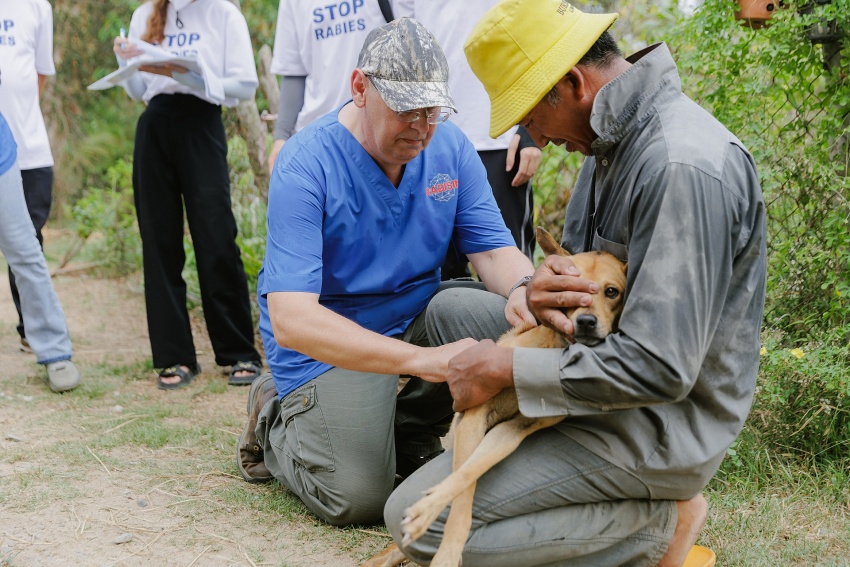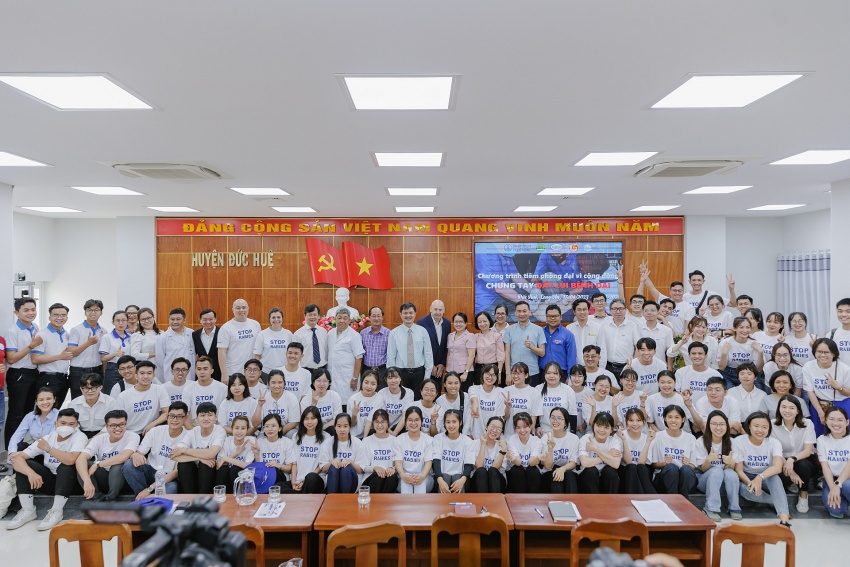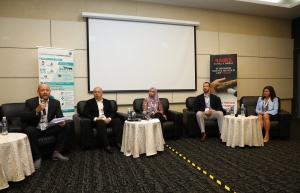Low vaccination rates and dog smuggling aiding transmission in Vietnam
 |
Boehringer Ingelheim unveiled a whitepaper titled Moving towards a rabies-free Southeast Asia, which was developed in collaboration with Eco-Business, at the Federation of Asian Veterinary Association Congress 2023 in Kuching, Malaysia on November 4.
Vietnam’s national rabies control efforts, which have included vaccinating the free-roaming dog population and appointing village leaders in remote areas to direct and monitor vaccination efforts, have gradually been making inroads into the issue.
The Ministry of Agriculture and Rural Development’s national initiative for rabies control and elimination for 2011-2015 led to a drop in human cases from 107 per year on average between 1996-2007 to an average of 95 per year. The government is aiming to eliminate human deaths from dog-transmitted rabies by 2030 through the 2022-2030 programme.
Le Quang Thong, associate professor at the faculty of Animal Science and Veterinary Medicine at Nong Lam University said, "The main constraints facing Vietnam’s rabies control efforts include limited access to animal vaccines, many free-roaming dogs that are unvaccinated, and a lack of awareness of the dangers of the disease and how to behave around dogs among people in remote areas."
The proportion of dogs and cats that have already been vaccinated against rabies stands at approximately 40 per cent. Due to various factors, only 13 out of the 58 provinces have achieved vaccination rates of 70 per cent, the proportion needed to achieve herd immunity, according to the whitepaper.
Karanvir Kukreja, Southeast Asia head of companion animal campaigns for the animal welfare group Four Paws said, "Vietnam’s low vaccination rate is due to the difficulty in managing free-roaming animals and rampant thefts, which have reduced the incentive for people to vaccinate their pets."
Professor Thong added that the relatively high cost of vaccinations for dog owners in rural areas and the lack of qualified veterinarians are contributing factors to Vietnam’s low vaccination rate.
In major urban centres such as Ho Chi Minh City, it is illegal for dogs to be out without a muzzle or a lead, with offenders being fined VND800,000 ($34). However, the law has not been strictly enforced, and the penalties are not considered steep enough to encourage more responsible dog ownership. Experts have called for stricter regulations and tougher progressive fines for repeat violations.
The dog meat trade contributes to rabies transmission in Vietnam, where there are no laws against its trade and consumption. An estimated five million dogs and one million cats are killed for their meat in Vietnam every year, making the Southeast Asian country the second-largest consumer of dog and cat meat after China. The trade poses a rabies risk because of the unregulated movement of dogs with unknown disease and vaccination status.
An investigation into the dog meat trade in Vietnam, published in August 2022, found that it had been disrupted by the pandemic due to the quarantine restrictions that limited trade. However, it is now recovering, posing an increasing rabies risk in the country.
In July, the Soi Dog Foundation and Vietnam’s National Assembly held a workshop to discuss the ultimate goal of banning the trade and consumption of dog and cat meat, starting in Hanoi where eating dog and cat meat is rooted in the local culture. A ban would be introduced along with anti-rabies measures and a safety zone for vaccinated dogs, officials said.
“The Vietnamese government is serious about meeting the 'Zero by 30' rabies target. To achieve it, the dog and cat meat trade must be banned,” said Rahul Sehgal, director of international advocacy at the Soi Dog Foundation.
However, Catherine Besch, founder and director of the Hoi An-based animal rescue and farm sanctuary Vietnam Animal Aid and Rescue, suggests that without the population control provided by the dog meat trade, Vietnam would have a far higher rabies rate.
“Culling is inevitable if we ban the dog meat trade here because there are no widespread sterilisation projects or any veterinary training going on,” she said.
 |
According to experts at the launch of the whitepaper, rabies is completely preventable with holistic programmes that focus on vaccination, education, and surveillance. By understanding the rabies landscape in the region, Boehringer Ingelheim continues to pursue a collaborative approach, involving governments, non-governmental organisations, veterinarians, pet owners, and the wider community, to drive progress towards a rabies-free Southeast Asia and improve health outcomes for both humans and animals.
In Vietnam, Boehringer Ingelheim Animal Health has joined the Department of Agriculture and Rural Development and Duc Hue People's Committee in Long An Province to implement the Rabies Vaccination for the Community initiative. Since 2021, a total of 19,400 cats and dogs have been vaccinated. This year alone, the drive provided free rabies vaccinations for close to 7,000 animals in Duc Hue district.
Torsten Hardge, director of Animal Health at Boehringer Ingelheim Vietnam said, "Our vaccination campaigns in Duc Hue district confirm that if animals are healthy, people are healthier too. As a leading animal health company, we are committed to contributing know how, vaccines, and research to protect animals and people against rabies. Providing education and supporting prevention efforts is of major importance to us."
Building on over 30 years of experience working in rabies prevention and management, Boehringer Ingelheim’s STOP Rabies programme reinforces the company’s mission to improve the health of both animals and humans. By contributing its expertise to the rabies elimination efforts that are already taking place in Southeast Asia and around the world, Boehringer continues to advocate for sustained, collaborative efforts to make meaningful advances towards eliminating the disease.
 | Boehringer Ingelheim strengthens commitment to transforming lives in Vietnam The Vietnamese market holds significant potential as compared to other Southeast Asian countries and the region. Cyndy B. Galimpin, general manager of Boehringer Ingelheim Vietnam, discussed the company's accomplishments and its future with VIR’s Bich Ngoc. |
 | Work continues on a rabies-free future Germany's Boehringer Ingelheim, along with Eco-Business, unveiled its 'STOP Rabies' whitepaper at the Federation of Asian Veterinary Association (FAVA) Congress on November 4 in Malaysia. |
What the stars mean:
★ Poor ★ ★ Promising ★★★ Good ★★★★ Very good ★★★★★ Exceptional
Related Contents
Latest News
More News
- List of newly-elected members of 14th Political Bureau announced (January 23, 2026 | 16:27)
- 14th Party Central Committee unanimously elects To Lam as General Secretary (January 23, 2026 | 16:22)
- List of members of 14th Party Central Committee announced (January 23, 2026 | 09:12)
- Highlights of fourth working day of 14th National Party Congress (January 23, 2026 | 09:06)
- Press provides timely, accurate coverage of 14th National Party Congress (January 22, 2026 | 09:49)
- Press release on second working day of 14th National Party Congress (January 22, 2026 | 09:19)
- Minister sets out key directions to promote intrinsic strength of Vietnamese culture (January 22, 2026 | 09:16)
- 14th National Party Congress: Renewed momentum for OVs to contribute to homeland (January 21, 2026 | 09:49)
- Party Congress building momentum for a new era of national growth (January 20, 2026 | 15:00)
- 14th National Party Congress’s opening: Great aspirations, steady steps (January 20, 2026 | 09:50)

 Tag:
Tag:

























 Mobile Version
Mobile Version